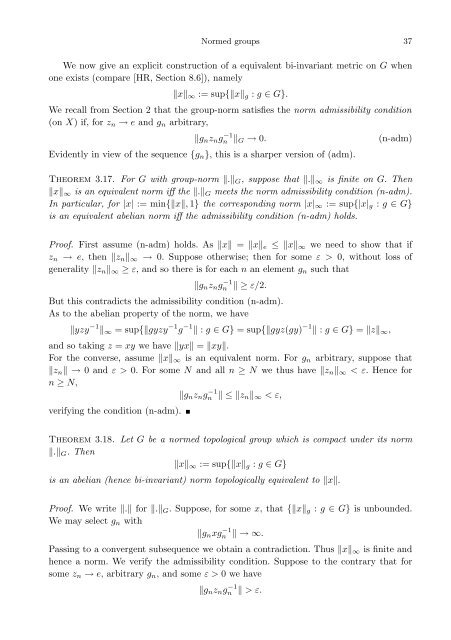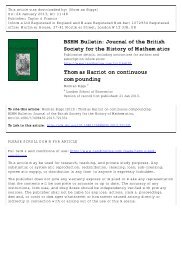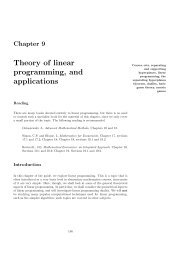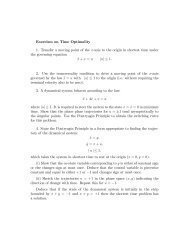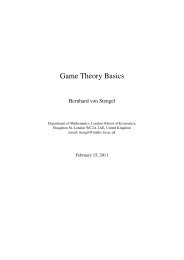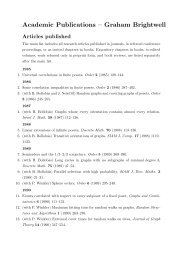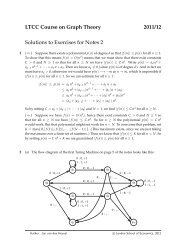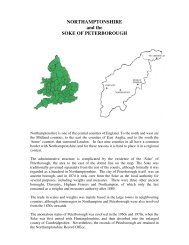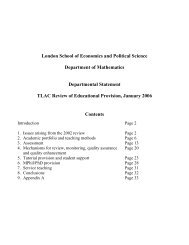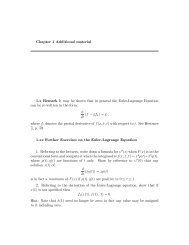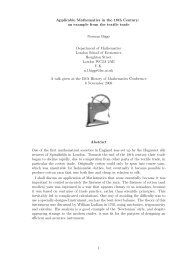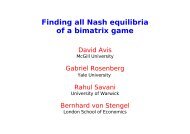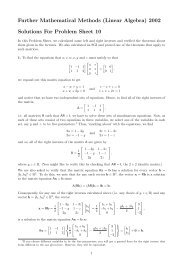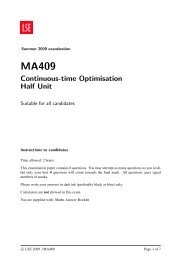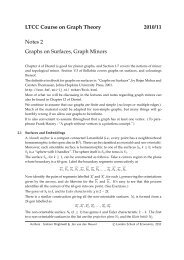36 N. H. Bingham <strong>and</strong> A. J. Ostaszewskiis a neighbourhood of t, i.e. for some δ = δ(ε) > 0, B δ (t) ⊂ {h(t) : ‖h‖ < ε}. Hence ifd T (s, t) < δ we have for some h in G with ‖h‖ H < ε that h(t) = s.If y, z ∈ B δ (t), there is h, k in G with ‖h‖ < ε <strong>and</strong> ‖k‖ < ε such that h(t) = y <strong>and</strong>k(t) = z. Thus kh −1 is in G, kh −1 (y) = z <strong>and</strong>‖kh −1 ‖ ≤ ‖k‖ + ‖h −1 ‖ = ‖k‖ + ‖h‖ ≤ 2ε,as the norm is inversion symmetric.For the final conclusion, taking for ε successively the values ε n = 1/n, we define δ n =δ(ε n ). Let z n → t. By passing to a subsequence we may assume that d T (z n , t) < δ n .Now there exists h n in G such that ‖h n ‖ < 2ε n <strong>and</strong> h n (t) = z n . As h n → id, we haveconstructed the ‘crimping sequence’ of homeomorphisms asserted.Remark. By Proposition 3.12, this result applies also to the closed subgroup of lefttranslations on T for T a Polish <strong>topological</strong> group.The Crimping Theorem implies the following classical result.Theorem 3.16 (Ungar’s Theorem, [Ung], [vM2, Th. 2.4.1, p. 78]). Let G be a subgroupof H(X). Let X be a compact metric space on which G acts transitively. For each ε > 0,there is δ > 0 such that for x, y with d(x, y) < δ there is h ∈ G such that h(x) = y <strong>and</strong>‖h‖ < ε.Proof. X is a Polish space, <strong>and</strong> H(X) = H u (X), as X is compact. Let ε > 0. By theCrimping Theorem, for each x ∈ X there is δ = δ(x, ε) > 0 such that for y, z ∈ B δ (x) thereis h ∈ G with h(y) = z <strong>and</strong> ‖h‖ < ε. Thus {B δ(x,ε) (x) : x ∈ X} covers X. By compactness,for some finite set F = {x 1 , ..., x N }, the space X is covered by {B δ(x,ε) (x) : x ∈ F }. Theconclusion of the theorem follows on taking δ = min{δ(x, e) : x ∈ F }.Definition. Let G be a normed group with group-norm ‖.‖. For g ∈ G, recall that theg-conjugate norm is defined by‖x‖ g := ‖γ g (x)‖ = ‖gxg −1 ‖.If left <strong>and</strong> right-shifts are continuous in G (in particular if G is a semi<strong>topological</strong> group),then ‖z n ‖ → 0 iff ‖z n ‖ g → 0.Example. For X a normed group with metric d X , take G = H u (X) normed by ‖h‖ :=‖h‖ H . Then‖h‖ g = sup x d X (ghg −1 (x), x) = sup z d X (g(h(z)), z).
<strong>Normed</strong> <strong>groups</strong> 37We now give an explicit construction of a equivalent bi-invariant metric on G whenone exists (compare [HR, Section 8.6]), namely‖x‖ ∞ := sup{‖x‖ g : g ∈ G}.We recall from Section 2 that the group-norm satisfies the norm admissibility condition(on X) if, for z n → e <strong>and</strong> g n arbitrary,‖g n z n g −1n ‖ G → 0. (n-adm)Evidently in view of the sequence {g n }, this is a sharper version of (adm).Theorem 3.17. For G with group-norm ‖.‖ G , suppose that ‖.‖ ∞ is finite on G. Then‖x‖ ∞ is an equivalent norm iff the ‖.‖ G meets the norm admissibility condition (n-adm).In particular, for |x| := min{‖x‖, 1} the corresponding norm |x| ∞ := sup{|x| g : g ∈ G}is an equivalent abelian norm iff the admissibility condition (n-adm) holds.Proof. First assume (n-adm) holds. As ‖x‖ = ‖x‖ e ≤ ‖x‖ ∞ we need to show that ifz n → e, then ‖z n ‖ ∞ → 0. Suppose otherwise; then for some ε > 0, without loss ofgenerality ‖z n ‖ ∞ ≥ ε, <strong>and</strong> so there is for each n an element g n such that‖g n z n gn−1 ‖ ≥ ε/2.But this contradicts the admissibility condition (n-adm).As to the abelian property of the norm, we have‖yzy −1 ‖ ∞ = sup{‖gyzy −1 g −1 ‖ : g ∈ G} = sup{‖gyz(gy) −1 ‖ : g ∈ G} = ‖z‖ ∞ ,<strong>and</strong> so taking z = xy we have ‖yx‖ = ‖xy‖.For the converse, assume ‖x‖ ∞ is an equivalent norm. For g n arbitrary, suppose that‖z n ‖ → 0 <strong>and</strong> ε > 0. For some N <strong>and</strong> all n ≥ N we thus have ‖z n ‖ ∞ < ε. Hence forn ≥ N,‖g n z n g −1n ‖ ≤ ‖z n ‖ ∞ < ε,verifying the condition (n-adm).Theorem 3.18. Let G be a normed <strong>topological</strong> group which is compact under its norm‖.‖ G . Then‖x‖ ∞ := sup{‖x‖ g : g ∈ G}is an abelian (hence bi-invariant) norm <strong>topological</strong>ly equivalent to ‖x‖.Proof. We write ‖.‖ for ‖.‖ G . Suppose, for some x, that {‖x‖ g : g ∈ G} is unbounded.We may select g n with‖g n xg −1n ‖ → ∞.Passing to a convergent subsequence we obtain a contradiction. Thus ‖x‖ ∞ is finite <strong>and</strong>hence a norm. We verify the admissibility condition. Suppose to the contrary that forsome z n → e, arbitrary g n , <strong>and</strong> some ε > 0 we have‖g n z n g −1n ‖ > ε.
- Page 1 and 2: N. H. BINGHAM and A. J. OSTASZEWSKI
- Page 3 and 4: Normed groups 3ContentsContents . .
- Page 5 and 6: 1. IntroductionGroup-norms, which b
- Page 7 and 8: Normed groups 3Topological complete
- Page 9 and 10: Normed groups 5abelian group has se
- Page 11 and 12: Normed groups 74 (Topological permu
- Page 13 and 14: Normed groups 9The following result
- Page 15 and 16: Normed groups 11Corollary 2.4. For
- Page 17 and 18: Normed groups 13More generally, for
- Page 19 and 20: Normed groups 15definitions, our pr
- Page 21 and 22: Normed groups 17so that fg is in th
- Page 23 and 24: Normed groups 19(iii) The ¯d H -to
- Page 25 and 26: Normed groups 21so‖αβ‖ ≤
- Page 27 and 28: Normed groups 23Remark. Note that,
- Page 29 and 30: Normed groups 25shows that [z n , y
- Page 31 and 32: Normed groups 27Denoting this commo
- Page 33 and 34: Normed groups 29Theorem 3.4 (Equiva
- Page 35 and 36: Normed groups 31argument as again p
- Page 37 and 38: Normed groups 33(ii) For α ∈ H u
- Page 39: Normed groups 35Definition. A group
- Page 43 and 44: Normed groups 39Theorem 3.19 (Abeli
- Page 45 and 46: Normed groups 412. Further recall t
- Page 47 and 48: Normed groups 43Theorem 3.22 (Lipsc
- Page 49 and 50: Normed groups 45Proof. Z γ = G (cf
- Page 51 and 52: Normed groups 47Theorem 3.30. Let G
- Page 53 and 54: Normed groups 49Remark. On the matt
- Page 55 and 56: Normed groups 51As for the conclusi
- Page 57 and 58: Normed groups 53By (C-adm), we may
- Page 59 and 60: Normed groups 55equipped with an in
- Page 61 and 62: Normed groups 57Proof. To apply Th.
- Page 63 and 64: Normed groups 59Definition. A point
- Page 65 and 66: Normed groups 61Proposition 3.46 (M
- Page 67 and 68: Normed groups 63Thus ω δ (s) ≤
- Page 69 and 70: Normed groups 65Remark. In the penu
- Page 71 and 72: Normed groups 67The result confirms
- Page 73 and 74: Normed groups 69Proof. By the Baire
- Page 75 and 76: Normed groups 715. Generic Dichotom
- Page 77 and 78: Normed groups 73Returning to the cr
- Page 79 and 80: Normed groups 75Examples. Here are
- Page 81 and 82: Normed groups 77cf. [Eng, 4.3.23].)
- Page 83 and 84: Normed groups 79Remarks. 1. See [Fo
- Page 85 and 86: Normed groups 81Theorem 6.1 (Catego
- Page 87 and 88: Normed groups 83is continuous at th
- Page 89 and 90: Normed groups 85compact. Evidently,
- Page 91 and 92:
Normed groups 87j ∈ ω} which enu
- Page 93 and 94:
Normed groups 89The result below ge
- Page 95 and 96:
Normed groups 91left-shift, not in
- Page 97 and 98:
Normed groups 93As a corollary of t
- Page 99 and 100:
Normed groups 953. For X a normed g
- Page 101 and 102:
Normed groups 97Proof. Note that‖
- Page 103 and 104:
Normed groups 99Taking h(x) := ‖
- Page 105 and 106:
Normed groups 1019. The Semigroup T
- Page 107 and 108:
Normed groups 103Theorem 9.5 (Semig
- Page 109 and 110:
Normed groups 105By the Category Em
- Page 111 and 112:
Normed groups 107Proof. Say f is bo
- Page 113 and 114:
Normed groups 109Thus G is locally
- Page 115 and 116:
Normed groups 111Theorem 10.10 (Bar
- Page 117 and 118:
Normed groups 113K-analyticity was
- Page 119 and 120:
Normed groups 115Theorem 11.6 (Disc
- Page 121 and 122:
Normed groups 117restricted to X\M
- Page 123 and 124:
Normed groups 119groups need not be
- Page 125 and 126:
Normed groups 121Proof. In the meas
- Page 127 and 128:
Normed groups 123Hence, as t i n
- Page 129 and 130:
Normed groups 125The corresponding
- Page 131 and 132:
Normed groups 127(t, x) ✛✻Φ T
- Page 133 and 134:
Normed groups 129Fix s. Since s is
- Page 135 and 136:
Normed groups 131Hence,‖x‖ −
- Page 137 and 138:
Normed groups 133converging to the
- Page 139 and 140:
Normed groups 135Definition. Let {
- Page 141 and 142:
Normed groups 137However, whilst th
- Page 143 and 144:
Normed groups 139embeddable, 14enab
- Page 145 and 146:
Normed groups 141Bibliography[AL]J.
- Page 147 and 148:
Normed groups 143Series 378, 2010.[
- Page 149 and 150:
Normed groups 145abelian groups, Ma
- Page 151 and 152:
Normed groups 147[Kak] S. Kakutani,
- Page 153 and 154:
Normed groups 149fields. I. Basic p
- Page 155:
Normed groups 151[So]R. M. Solovay,


